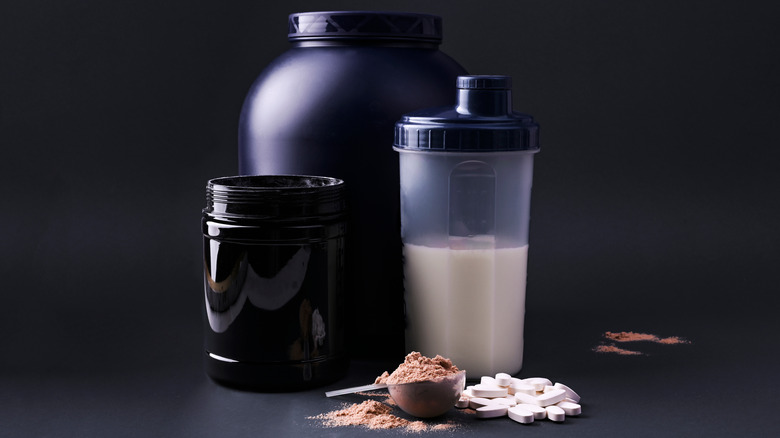Performance-Enhancing Supplements Could Affect Your Health, Even If They're Legal
The American Academy of Pediatrics offers nutritional guidelines to athletes including properly hydrating, fueling up with carbohydrates, and starting your day off with breakfast as just a few key ways to optimize athletic performance. However, there are performance-enhancing supplements available on the market for purchase that are touted to further increase athletic ability. While legal, they are not approved by the United States Food and Drug Administration (FDA).
Creatine, caffeine, anabolic steroids, steroid precursors, and stimulants such as amphetamines are all commonly used performance-enhancing drugs (via Mayo Clinic). Supplements, in particular, may come in the form of tablets, powders, liquids, bars, or capsules, the majority of which contain amino acids, protein, caffeine, and creatine (via National Institutes of Health). Advertised to boost muscle strength, endurance, accelerate performance goals, and raise one's tolerance for exercise intensity, performance-enhancing supplements have become popular amongst athletes and gym-goers.
However, new research indicates that the use of performance-enhancing supplements can take a significant toll on our health.
When supplementing can become dangerous
The use of performance-enhancing supplements is prevalent in both adolescents and adults. A survey conducted between 2007 and 2008 involving over 100,000 military personnel participants found that bodybuilding dietary supplements were used by nearly 23% of men and over 5% of women. The use of such supplements was also linked to a decreased sleep quality (via National Institutes of Health). Now, a 2022 scientific study published in the European Journal of Preventive Cardiology cites that the use of sports-enhancing dietary supplements can negatively impact cardiovascular health, cause gastrointestinal distress, deep-vein thromboses, atrial fibrillation, cardiac arrhythmia, chest pain, and even sudden death. The study also states that combinations of various supplements and vitamins can have highly negative impacts. Vitamin and mineral supplements such as vitamin D, iron, and multivitamins, were linked to adverse health effects when taken in combination with other performance-enhancing products and at improper doses.
Dr. Paolo Emilio Adami, an author of the study, spoke to Medical News Today, stating, "The most important takeaway is that athletes are always personally responsible for any substances they consume. This also applies to natural supplements and substances, which are not necessarily safe, therefore should only be used if recommended by professional nutritionists."


